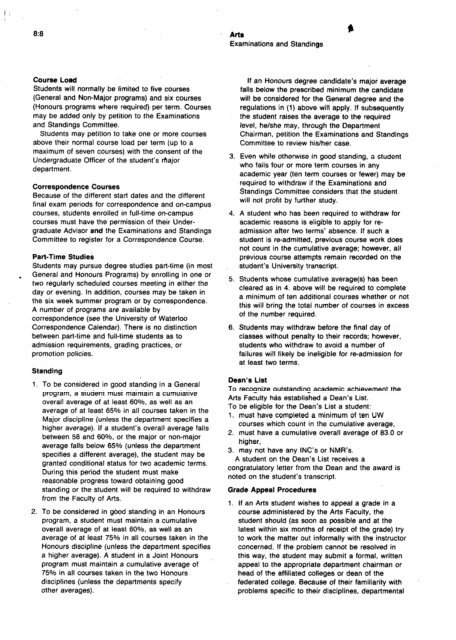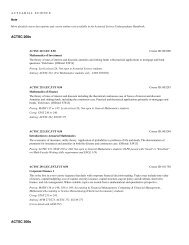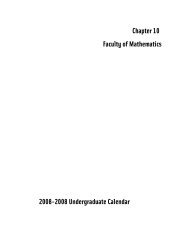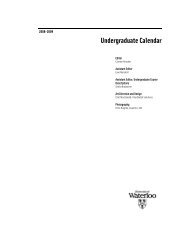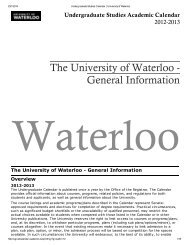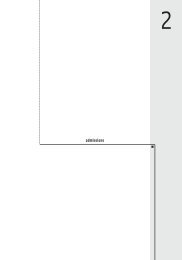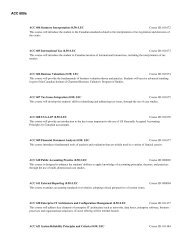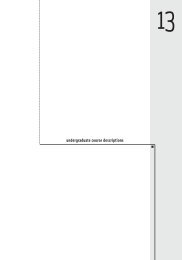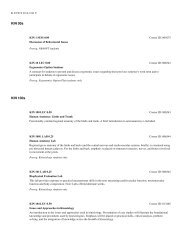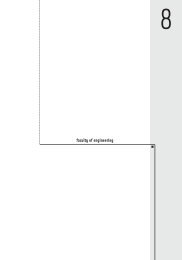I 2 - Undergraduate Calendar - University of Waterloo
I 2 - Undergraduate Calendar - University of Waterloo
I 2 - Undergraduate Calendar - University of Waterloo
Create successful ePaper yourself
Turn your PDF publications into a flip-book with our unique Google optimized e-Paper software.
63 Art8 c<br />
Course Load<br />
Students will normally be limited to five courses<br />
(General and Non-Major programs) and six courses<br />
(Honours programs where required) per term. Courses<br />
may be added only by petition to the Examinations<br />
and Standings Committee.<br />
Students may petition to take one or more courses<br />
above their normal course load per term (up to a<br />
maximum <strong>of</strong> seven courses) with the consent <strong>of</strong> the<br />
<strong>Undergraduate</strong> Officer <strong>of</strong> the student’s major<br />
department.<br />
Correspondence Courses<br />
Because <strong>of</strong> the different start dates and the different<br />
final exam periods for correspondence and on-campus<br />
courses, students enrolled in full-time on-campus<br />
courses must have the permission <strong>of</strong> their Under-<br />
graduate Advisor and the Examinations and Standings<br />
Committee to register for a Correspondence Course.<br />
Part-Time Studies<br />
Students may pursue degree studies part-time (in most<br />
� General and Honours Programs) by enrolling in one or<br />
two regularly scheduled courses meeting in either the<br />
day or evening. In addition, courses may be taken in<br />
the six week summer program or by correspondence.<br />
A number <strong>of</strong> programs are available by<br />
correspondence (see the <strong>University</strong> <strong>of</strong> <strong>Waterloo</strong><br />
Correspondence <strong>Calendar</strong>). There is no distinction<br />
between part-time and full-time students as to<br />
admission requirements,, grading practices, or<br />
promotion policies.<br />
Standing<br />
1. To be considered in good standing in a General<br />
program, a student must maintain a cumulative<br />
overall average <strong>of</strong> at least 60%, as well as an<br />
average <strong>of</strong> at least 65% in all courses taken in the<br />
Major discipline (unless the department specifies a<br />
higher average). If a student’s overall average falls<br />
between 56 and 600/o, or the major or non-major<br />
average falls below 65% (unless the department<br />
specifies a different average), the student may be<br />
granted conditional status for two academic terms.<br />
During this period the student must make<br />
reasonable progress toward obtaining good<br />
standing or the student will be required to withdraw<br />
from the Faculty <strong>of</strong> Arts.<br />
2. To be considered in good standing in an Honours<br />
program, a student must maintain a cumulative<br />
overall average <strong>of</strong> at least 60%, as well as an<br />
average <strong>of</strong> at least 75% in all courses taken in the<br />
Honours discipline (unless the department specifies<br />
a higher average). A student in a Joint Honours<br />
program must maintain a cumulative average <strong>of</strong><br />
75% in all courses taken in the two Honours<br />
disciplines (unless the departments specify<br />
other averages).<br />
Examinations and Standings<br />
If an Honours degree candidate’s major average<br />
falls below the prescribed minimum the candidate<br />
will be considered for the General degree and the<br />
regulations in (1) above wili apply. If subsequently<br />
the student raises the average to the required<br />
level, he/she may, through the Department<br />
Chairman, petition the Examinations and Standings<br />
Committee to review his/her case.<br />
Even while otherwise in good standing, a student<br />
who fails four or more term courses in any<br />
academic year (ten term courses or fewer) may be<br />
required to withdraw if the Examinations and<br />
Standings Committee considers that the student<br />
will not pr<strong>of</strong>it by further study.<br />
A student who has been required to withdraw for<br />
academic reasons is eligible to apply for re-<br />
admission after two terms’ absence. If such a<br />
student is re-admitted, previous course work does<br />
not count in the cumulative average: however, all<br />
previous course attempts remain recorded on the<br />
student’s <strong>University</strong> transcript.<br />
Students whose cumulative average(s) has been<br />
cleared as in 4. above will be required to complete<br />
a minimum <strong>of</strong> ten additional courses whether or not<br />
this will bring the total number <strong>of</strong> courses in excess<br />
<strong>of</strong> the number required.<br />
Students may withdraw before the final day <strong>of</strong><br />
classes without penalty to their records; however,<br />
students who withdraw to avoid a number <strong>of</strong><br />
failures will likely be ineligible for re-admission for<br />
at least two terms.<br />
Dean’s List<br />
To recognize outstanding academic achievement the<br />
Arts Faculty h&i established a Dean’s List.<br />
To be eligible for the Dean’s List a student:<br />
1. must have completed a minimum <strong>of</strong> ten UW<br />
courses which count in the cumulative average,<br />
2. must have a cumulative overall average <strong>of</strong> 83.0 or<br />
higher,<br />
3. may not have any INC’s or NMR’s.<br />
A student on the Dean’s List receives a<br />
congratulatory letter from the Dean and the award is<br />
noted on the student’s transcript.<br />
Grade Appeal Procedures<br />
1. If an Arts student wishes to appeal a grade in a<br />
course administered by the Arts Faculty, the<br />
student should (as soon as possible and at the<br />
latest within six months <strong>of</strong> receipt <strong>of</strong> the, grade) try<br />
to work the matter out informally with the instructor<br />
concerned. If the problem cannot be resolved in<br />
this way, the student may submit a formal, written<br />
appeal to the appropriate department chairman or<br />
head <strong>of</strong> the affiliated colleges or dean <strong>of</strong> the<br />
federated college. Because <strong>of</strong> their familiarity with<br />
problems specific to their disciplines, departmental


